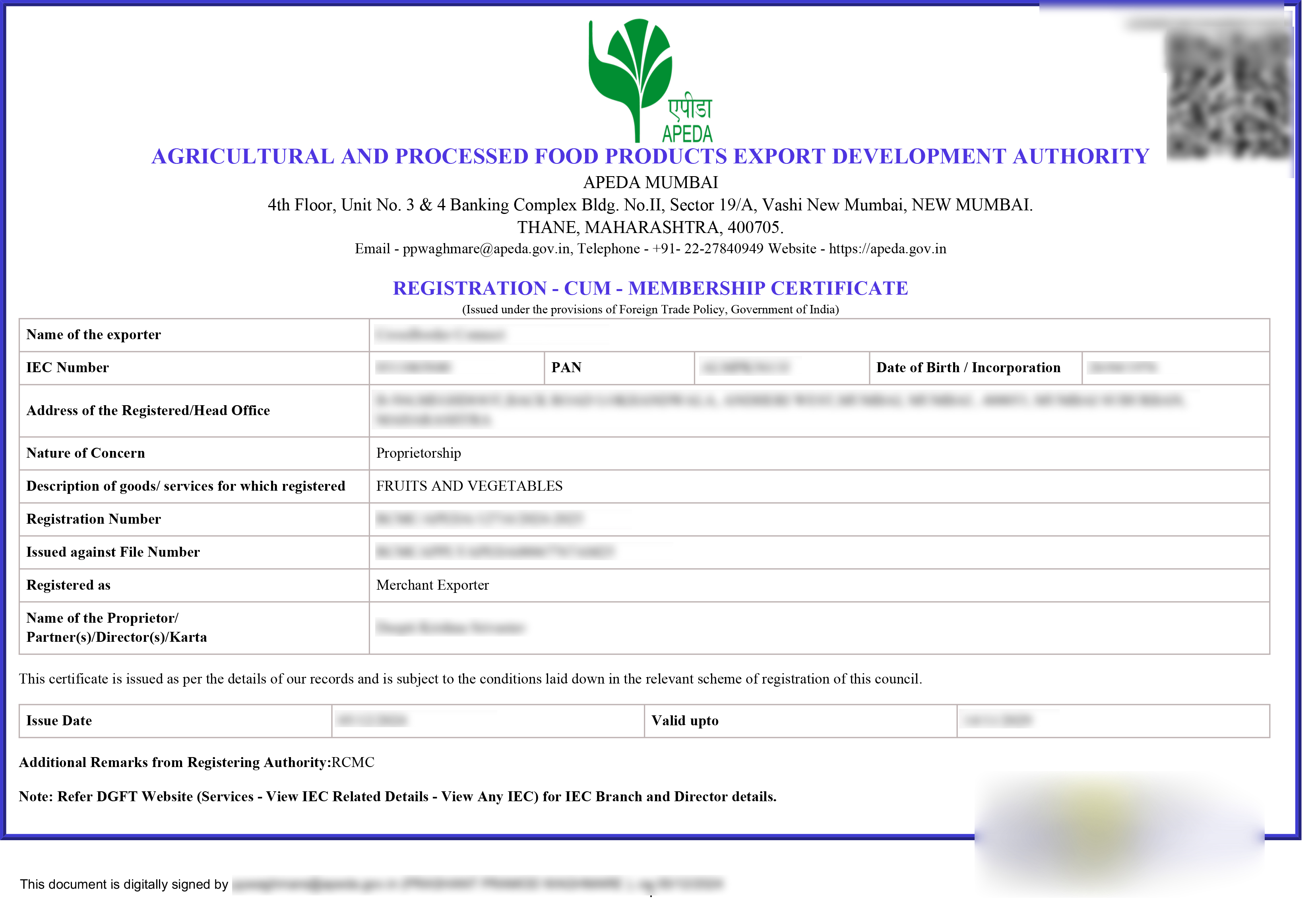
Get Instant Solution By an Expert Advisor
(4.8)
APEDA registration refers to the process of enlisting with the Agricultural and Processed Food Products Export Development Authority, a government agency in India. Aimed at promoting and regulating the export of agricultural products, APEDA registration is mandatory for Indian exporters dealing with specified commodities. This includes fruits, vegetables, cereals, processed foods, and more. The registration ensures compliance with quality standards and facilitates international trade by granting access to various incentives, schemes, and market information. It is a crucial step for businesses seeking to export agricultural and processed food products, enhancing their credibility and enabling them to tap into global markets seamlessly.


10000 +
Projects Completed for Our Respected Clients.
15 +
Years Experienced Advisors in Indian Compliance.
98.9%
Project Delivery Ratio for Our Valuable Clients.
99.9%
Satisfied Customers All Over India.
Agricultural and Processed Food Goods Export Development Authority in short APEDA registration is the process that companies and people who export agricultural and processed food goods go through to become members of the APEDA. This process is in India. In addition to being a means of ensuring compliance with quality standards and legal requirements, this registration is required for anyone wishing to export several types of goods. Applications that applicants must submit in order to obtain APEDA registration typically comprise business details, product specifications, and supporting paperwork. Following registration, exporters can benefit from a plethora of APEDA-provided benefits and services, including financial assistance, facilitated market access, and guidance on complying with international quality standards, all of which contribute to the eventual growth of India's agricultural exports.
APEDA identifies potential markets for Indian agricultural and processed food products on the global stage. It works towards creating opportunities for Indian exporters to establish a presence in international markets.
APEDA is responsible for the establishment and upkeep of quality standards for different processed and agricultural food products.
APEDA conducts research and development to raise the productivity and quality of agricultural output.
APEDA promotes the export of processed agricultural products, contributing to higher profit for farmers and increased export revenue for India.
APEDA issues several types of certifications to ensure the quality, safety, and compliance of agricultural and processed food products exported from India. Some of the key certifications provided by the Agricultural and Processed Food Products Export Development Authority include:
This is a primary certification issued by APEDA to exporters, and it serves as a registration and membership document. Exporters need to obtain RCMC to be eligible for various benefits and facilities provided by the Agricultural and Processed Food Products Export Development Authority.
The Agricultural and Processed Food Products Export Development Authority is involved in promoting organic farming and exports and offers organic certification for organic products, ensuring that they meet the standards set for organic production and processing.
Agricultural and Processed Food Products Export Development Authority is involved in setting and maintaining quality standards for various agricultural and processed food products. Certification in this regard ensures that the exported products meet international quality requirements

APEDA registration is open to various entities involved in the export of agricultural and processed food products from India. The following entities are eligible to apply for APEDA registration:
Individuals engaged in the export of agricultural and processed food products can apply for APEDA registration.
Partnership firms involved in export activities related to agricultural and processed food products are eligible for APEDA registration.
Private limited companies engaged in the export of agricultural and processed food products can apply for APEDA registration.
Public limited companies involved in export activities related to agricultural and processed food products are eligible to register with APEDA.
AOPs or BOIs engaged in export activities related to agricultural and processed food products can apply for APEDA registration.
Cooperative societies involved in exporting agricultural and processed food products are eligible for APEDA registration.
Ensure that your business or entity is eligible for APEDA registration. Generally, entities involved in the export of specified agricultural and processed food products are eligible.
Visit the official APEDA website and navigate to the "Online Application" section.
Upload the necessary documents required for registration. The documents may include: IEC, Bank Certificate, Cancelled Cheque etc.
Pay the registration fees online. The fees may vary, and you can check the current fee structure on the APEDA website.
Upon successful submission, you will receive an acknowledgement receipt with a unique registration number. Note down or print this acknowledgement for future reference.
APEDA may conduct a verification process to ensure the accuracy of the information provided in the application. This may involve a visit to the business premises.
Once the application is approved, APEDA issues the Certificate RCMC, which serves as proof of registration.
Before the expiration of the RCMC, businesses must apply for renewal to continue enjoying the benefits of APEDA registration.
The Agricultural and Processed Food Products Export Development Authority (APEDA) provides various benefits to the businesses involved in the export of agricultural and processed food products from India. Some key benefits of APEDA include:
APEDA facilitates market access for exporters by identifying potential markets, promoting Indian products globally, and providing assistance in market development.
Registered entities can avail themselves of financial assistance and incentives offered by APEDA, including schemes for market promotion, product development, and participation in international trade fairs.
APEDA is involved in setting and maintaining quality standards for agricultural and processed food products, ensuring that exported items meet international quality and safety requirements.
In order to improve the effectiveness of export operations, APEDA promotes the construction of infrastructure connected to agricultural exports, such as cold storage facilities, processing facilities, and transportation networks.
By offering technical assistance to exporters, APEDA helps them implement best practices, raise the calibre of their products, and follow international standards, all of which increase the competitiveness of Indian goods on the world market.
APEDA plays a role in protecting products with geographical indications, providing recognition and protection for products with unique characteristics based on their geographical origin.
APEDA fosters networking opportunities by organizing events, seminars, and initiatives that bring together exporters, industry experts, and stakeholders, promoting collaboration and knowledge exchange.
APEDA supports organic farming by providing certification for organic products, catering to the growing demand for organic and sustainably produced agricultural items in the international market.
APEDA encourages the export of value-added and processed agricultural products, helping exporters diversify their product range and increase market demand.
APEDA registration enhances the credibility of exporters, signalling a commitment to quality and compliance with global standards.
APEDA registration is mandatory in India for entities involved in the export of certain specified agricultural and processed food products. The mandatory nature of APEDA registration is driven by several reasons:
APEDA is responsible for maintaining quality standards for agricultural and processed food products. This ensures that the exporters should follow such standards by contributing to the quality and safety of the products being exported.
APEDA registration ensures that Indian exporters adhere to these standards, promoting compliance with international trade norms.
APEDA registration enhances the credibility of exporters in the global market. It signals to international buyers that the products meet specified quality and safety standards, fostering trust and recognition.
APEDA provides various financial incentives and support schemes to promote the export of agricultural products. Mandatory registration allows eligible exporters to avail themselves of these benefits, contributing to the growth of the export sector.
Mandatory registration enables APEDA to collect essential data on the export of agricultural products. This data is crucial for monitoring trends, assessing market demands, and formulating effective policies to support the growth of the sector.
APEDA plays a role in protecting products with geographical indications. Mandatory registration ensures that products with unique characteristics based on their geographical origin receive appropriate recognition and protection.
APEDA supports the development of infrastructure related to agricultural exports. Mandatory registration allows for targeted efforts in developing facilities such as cold storage, processing units, and transportation networks.
APEDA is involved in promoting sustainable and organic farming practices. Mandatory registration ensures that entities engaged in these practices receive support and certification, contributing to environmentally friendly and sustainable agricultural exports.
Agile Regulatory assists businesses with the process of obtaining an APEDA Certificate. We specialize in understanding the regulatory requirements and intricacies of the application process. Our role typically involves guiding businesses through the documentation process, ensuring that all necessary paperwork is in order and meets the specified criteria. Additionally, we provide insights into the current regulations, APEDA registration fee structures, and any recent updates related to the same.
We assist in the accurate completion of the application form, help with the submission of required documents, and offer advice on compliance matters. By leveraging our expertise, Agile Regulatory aims to streamline the APEDA registration process for businesses, saving time and ensuring that the application is in accordance with the Agricultural and Processed Food Products Export Development Authority's standards.

Get Instant Solution By an Expert Advisor
(4.8)
APEDA, or the Agricultural and Processed Food Products Export Development Authority, is an autonomous organization established by the Government of India. Its main role is to promote and develop the export of agricultural and processed food products.
Entities engaged in the export of specified agricultural and processed food products from India need to register with APEDA. This includes individuals, companies, partnership firms, and others involved in export activities.
APEDA registration offers benefits such as market access facilitation, financial assistance, quality assurance, infrastructure development support, and opportunities for networking and promotion.
Commonly required documents include IEC (Import Export Code), bank certificate, cancelled cheque, address proof, PAN card, partnership deed (for partnership firms), and relevant certificates for companies.
The Registration-cum-Membership Certificate (RCMC) issued by APEDA is typically valid for five years. Entities need to renew their registration before it expires to continue enjoying the associated benefits.
APEDA registration is mandatory for the export of certain specified agricultural and processed food products. The list of products subject to mandatory registration is available on the APEDA website.
Proven 4-step Process: Consultation, Documentation, Submission, and Certification.
Startups to large enterprises, we deliver end-to-end solutions business compliance needs.

What our customer says about us
Fantastic support from the team. Their expertise transformed our approach, driving remarkable outcomes. A must-have partner for businesses seeking effective consulting solutions. Highly recommended.

Lavkush Sharma
KTPL Instruments
Agile Regualtory delivers exceptional solutions. Their insightful guidance streamlined our processes and boosted profitability. Highly recommended for businesses seeking expert consulting services to thrive.

Nitin Mukesh
Justrack IOT
Impressed by Agile Regulatory's expertise. Their strategic insights and practical solutions have elevated our business operations. A reliable partner for effective consulting services. Highly recommended for growth-focused businesses.

Pradeep Varma
Coaire Compressor
Extraordinary consulting services. Their insightful solutions and dedicated team reshaped our business, driving remarkable improvements. Highly recommend it for transformative results.

Bharat Bachwani
Easy Polymer
Incredible experience with Agile Regulatory. Their innovative strategies and expert advice revitalized our business model, resulting in impressive growth. Highly recommend their exceptional consulting services.

Atul Jain
Tarus International
Top-tier consulting! offered strategic solutions that revolutionized our approach. Their deep expertise and personalized guidance made a significant impact on our success. Highly recommend their services.

Paramjeet Singh
Anchor Weighing
Agile Regulatory exceeded expectations! Their tailored solutions, expertise, and proactive approach led to remarkable results. Highly recommend for businesses seeking impactful and strategic guidance.

Anshul Rathi
AM Capacitor
Outstanding service! delivered targeted solutions with professionalism and expertise. Their insights elevated our business strategies, resulting in noticeable growth. Highly recommended for exceptional consultation.

Shekhar Maurya
Imaxx Pro Aquistic